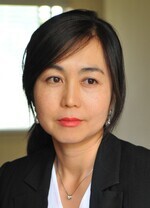hankyoreh
Links to other country sites 다른 나라 사이트 링크
[Column] What does it mean to be Korean in the 21st century?


By Ahn Hee-kyung, US journalist
It was the school’s first graduation ceremony in four years — not just because of COVID-19, but also because it’s rare for students to graduate.
Saturdays at 9:30 am, 93 children arrive at the Korean School of Sacramento. Most travel more than half an hour on the freeway to get there. From preschoolers to middle and high school students in the advanced class, everyone is there to learn how to speak, read and write in Korean.
There are two classes taught in English for older students with a low level of Korean. One of those is open to adults as well.
As students advance through the levels, older kids — typically in the fourth, fifth, and sixth grades of elementary school — start fighting with their parents about the Korean classes. Most of them eventually stop going.
But two young women graduated from school one Saturday after taking classes there for 10 years. More than 110 people, including both students and volunteers, filled the auditorium for the ceremony.
I’d also spent my Saturdays there for the last decade, but I was struck by a question. Why do these children show up here every Saturday?
I interviewed twenty or so parents of those children in search of an answer.
First-generation immigrants said they’d sent their children here in the hope of having in-depth conversations with their children in Korean.
A brother and sister who’d been attending the classes for five years were brought by their grandmother, a Korean woman who was married to an American. I suppose Americans would say the kids were one-quarter Korean, biologically speaking.
Koreans steeped in the belief that they’re descended from Dangun, Korea’s legendary founder, might regard the grandmother’s actions as a form of patriotism.
When Americans began enrolling in Korean schools four years ago, first-generation Korean parents were abuzz with the idea that Korea’s national prestige had improved.
It was around that time that the children of second-generation Korean Americans began to make up more of the students in the preschool and lower elementary classes. Those parents are more interested in relationships and culture than in the language itself.
“We went to a Chinese restaurant, and my child saw the Chinese character meaning ‘fire’ and said, ‘That’s fire!’ It was so gratifying to see him put to use what he had learned in Korean school. But I like even more that my children are surrounded by Koreans,” said Jae Ahn, the father of two sons.
Grace Shim, who is from New York, said she was taken aback by much studying the Korean school insisted on. She wanted to focus more on Korean culture, calling the homework a hassle. She added that she would like nothing better than to share in the same cultural heritage and make friends who speak the same language as their grandparents.
Some of the American parents were even more enthusiastic about their children’s studies than their Korean spouses. These included Gurdeep Dhaliwal, a mother of three, and Jim Keller, the father of two daughters. Keller had his older daughter attend a preschool in Korea with her mother for three months when she was two years old; last spring, the couple sent their second daughter to live in Korea for a month.
The education was undertaken as a way of offering voluntary support.
“You have to gain a basic foundation in the language when you’re a small child. It’s necessary to think like a Korean and have memories of Korea.”
These days, more and more families boast a multicultural identity.
Agustina Carando speaks Spanish to her daughter, while her husband speaks to her in Korean. The daughter decides her own identity from moment to moment, Carando explained: She feels like a Korean in Korean school, but speaks Spanish when she is with her grandmother in Argentina.
A professor who researches bilingualism, Carando stressed the importance of perceptions related to language and one’s own culture in establishing a sense of identity.
Whether their parents are first- or second-generation immigrants, the students at the Korean school come with the same mindset: they want to live as American citizens, while also welcoming their own internal roots.
One Korean school outing last month was attended by the adoptive family of Flora, who is currently on the waiting list. For the sake of their daughter, the family relocated from Pittsburgh to California, which has a large number of Asian residents.
Her mother Shaye Maverick said, “Flora is going to feel like she’s on the periphery in different situations. She won’t feel like she’s fully American or Korean.”
“If she isn’t connected with Korean culture, she may end up learning anger, where she’s repressing or rejecting that division. I can’t carry that weight for her, but I’ll take on as much as I can,” she added.
We live in an era of globalization, where boundaries of identity are increasingly blurred. Ethnic borders are growing fuzzier, along with the bases for our feelings. What sort of boundaries do we see in the Koreans who live in Korea? Even within the framework of Korean nationality, there are multiple cultural identities.
I didn’t write this piece in the hopes of seeing more Korean schools being built around the world, or more financial support being sent their way. I certainly don’t want to suggest that the children should be “managed” on the off chance that one of them will grow up to become a US Cabinet secretary.
Instead, I want to point out that just as the world is always changing, Korean identity has also undergone transformations. Having lived in the US as an immigrant minority, I want to see first- and second-generation immigrants in Korea welcoming their own identity within, seeking out their roles as citizens in their own right.
The less time individuals spend feeling deprived, the higher that society’s safety index rises. This is why it is so important for a given society to support diverse cultural identities.
Please direct questions or comments to [english@hani.co.kr]

Editorial・opinion
![[Editorial] Penalties for airing allegations against Korea’s first lady endanger free press [Editorial] Penalties for airing allegations against Korea’s first lady endanger free press](https://flexible.img.hani.co.kr/flexible/normal/500/300/imgdb/original/2024/0502/1817146398095106.jpg) [Editorial] Penalties for airing allegations against Korea’s first lady endanger free press
[Editorial] Penalties for airing allegations against Korea’s first lady endanger free press![[Editorial] Yoon must halt procurement of SM-3 interceptor missiles [Editorial] Yoon must halt procurement of SM-3 interceptor missiles](https://flexible.img.hani.co.kr/flexible/normal/500/300/imgdb/child/2024/0501/17145495551605_1717145495195344.jpg) [Editorial] Yoon must halt procurement of SM-3 interceptor missiles
[Editorial] Yoon must halt procurement of SM-3 interceptor missiles- [Guest essay] Maybe Korea’s rapid population decline is an opportunity, not a crisis
- [Column] Can Yoon steer diplomacy with Russia, China back on track?
- [Column] Season 2 of special prosecutor probe may be coming to Korea soon
- [Column] Park Geun-hye déjà vu in Yoon Suk-yeol
- [Editorial] New weight of N. Korea’s nuclear threats makes dialogue all the more urgent
- [Guest essay] The real reason Korea’s new right wants to dub Rhee a founding father
- [Column] ‘Choson’: Is it time we start referring to N. Korea in its own terms?
- [Editorial] Japan’s rewriting of history with Korea has gone too far
Most viewed articles
- 160% of young Koreans see no need to have kids after marriage
- 2Presidential office warns of veto in response to opposition passing special counsel probe act
- 3[Editorial] Penalties for airing allegations against Korea’s first lady endanger free press
- 4[Editorial] Japan’s rewriting of history with Korea has gone too far
- 5Japan says it’s not pressuring Naver to sell Line, but Korean insiders say otherwise
- 6For survivor, Jeju April 3 massacre is a living reality, not dead history
- 7[Column] Park Geun-hye déjà vu in Yoon Suk-yeol
- 8Months and months of overdue wages are pushing migrant workers in Korea into debt
- 9[Guest essay] Maybe Korea’s rapid population decline is an opportunity, not a crisis
- 10Hybe-Ador dispute shines light on pervasive issues behind K-pop’s tidy facade